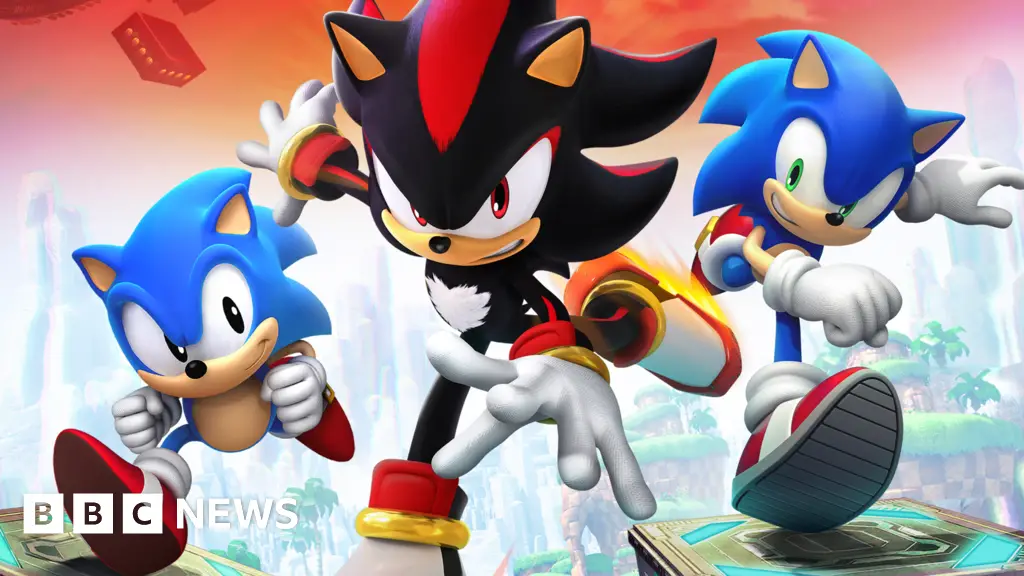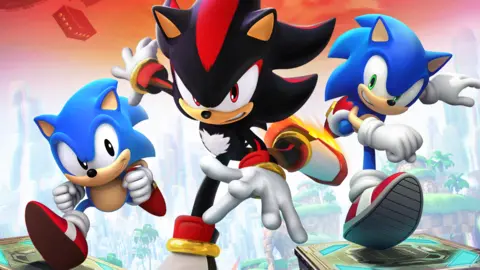 Sega
SegaSega is considering launching its own Netflix-like subscription service for video games, a move that would accelerate gaming’s transition to streaming.
There are already a number of similar services on the market – such as Xbox Game Pass and PlayStation Plus – where players pay a monthly fee to access a range of titles rather than owning them outright.
Sega’s president, Shuji Utsumi, told the BBC that such subscription products were “very interesting” and that his company was “exploring some possibilities.”
“We are thinking about something – and discussing something – that we cannot disclose at the moment,” he said.
Some in the industry have expressed concern about the move, but told the BBC it could result in gamers spending “more money” on multiple subscription services.
It’s not just Sony and Microsoft that offer gaming subscriptions – there are now countless players in this space, and competitors like Nintendo, EA and Ubisoft all offer their own membership plans.
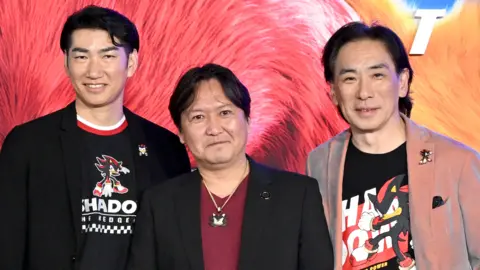 Getty Images
Getty ImagesVarious Sega games are currently available on multiple streaming services.
The amount these services charge individually depends on the features and games available. For example, Xbox Game Pass prices range from £6.99 to £14.99 per month, while PlayStation Plus ranges from £6.99 to £13.49 per month.
Therefore, it would make financial sense for Sega if the people who play its titles paid subscription fees to Sega rather than the competition.
It might also appeal to people who primarily want to play Sega games – but it might come at a higher cost for everyone else.
Rachel Howie streams herself playing games on Twitch, where she is known by her fans as DontRachQuit, and said she was “excited and worried” about another subscription service
“We already have so many subscriptions that it is very difficult for us to justify taking out a new subscription,” she told the BBC.
“I think SEGA will definitely have a dedicated core audience that will benefit from this, but will the average gamer choose this over Game Pass?”
And Sophie Smart, production manager at British developer No More Robots, agreed.
“As someone whose first console was the Sega Mega Drive, I would love more than anything to see Sega thrive, and this feels like a step in a modern direction,” she said.
However, she questioned whether Sega would have actually created a competing subscription service if it would result in their games being removed from other services.
“If so, that could mean consumers will spend more money owning multiple subscription services,” she said.
Bring Sega back
Shuji Utsumi spoke to the BBC ahead of the premiere of the film Sonic 3 on Saturday, after a year of overseeing the release of Metaphor: ReFantazio, Like a Dragon: Infinite Wealth and the latest game Sonic the Hedgehog.
Our conversation started in an unexpected way.
The very first thing Mr. Utsumi said to me seemed to suggest that the company, which dominated the gaming industry in the 1990s with a rivalry between Sonic the Hedgehog and Nintendo’s Super Mario, may have lost its way.
“I want to make Sega really shine again,” he said.
He said Sega had focused too much on domestic success in Japan and needed to re-establish itself on the global stage, which would mean expanding beyond its base.
“Sega kind of lost confidence,” he said.
“But why? Sega has a great RPG group, Sega has amazing IPs, Sega is a really well-known brand.”
“So I thought, hey, now is not the time to be defensive, but to be more offensive.”
He said the company was too concerned with cost control when he took over and that he wanted to “bring a rock ‘n’ roll mentality to gaming.”
When I told him that sounded familiar – Sega’s marketing in the ’90s often tried to position Sonic the Hedgehog as the cool alternative to Mario – he agreed.
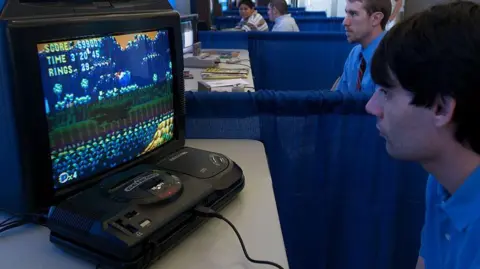 Getty Images
Getty ImagesHe said the company now simply needs to make “a great game” in the series.
“The next one is going to be a pretty challenging, pretty exciting game that we’re working on,” he said.
However, he did not want to reveal whether Sega is considering a sequel to the popular Sonic Adventure series.
“Sonic Adventure was kind of a game-changer for Sonic,” he said.
“When we release it, it should be good, it should be impressive – we have to meet or even exceed people’s expectations, so it takes some time.”
One part of the series that fans have long awaited the return of is the Chao Garden – a popular virtual pet synonymous with Sonic Adventure.
Mr Utsumi said “we have talked about it” but would not go into further detail, saying only that he “can’t say too much about it”.
Sega’s future
Unsurprisingly, Mr. Utsumi spoke about the company’s achievements this year, which included winning multiple gaming awards with the new IP Metaphor: ReFantazio, developed by the team behind the Persona series.
However, it hasn’t all been positive for the company, with job cuts in March and Football Manager 2025 delayed until next year.
“It was a tough decision,” he said of the cuts 240 people lost their jobs.
“But when you take the initiative again, you have to make this difficult decision.”
And he said Football Manager was held up because of “a quality issue”.
“I mean, from a financial perspective, maybe delivering the game early may be a better choice.”
“But we decided to maintain the level of quality – to maintain that discipline.”
And he also talked about how Sega’s year outside of gaming has been, with several film and television adaptations culminating with the release of the third Sonic the Hedgehog film on Saturday.
“I just saw the film – it’s so much fun. It would be nice if this kind of excitement continued.”
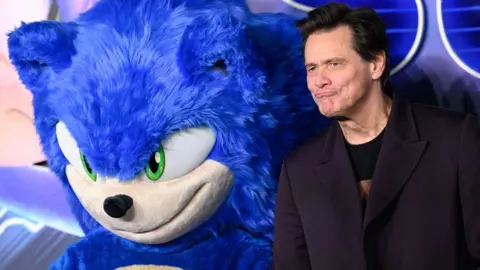 Getty Images
Getty Images

